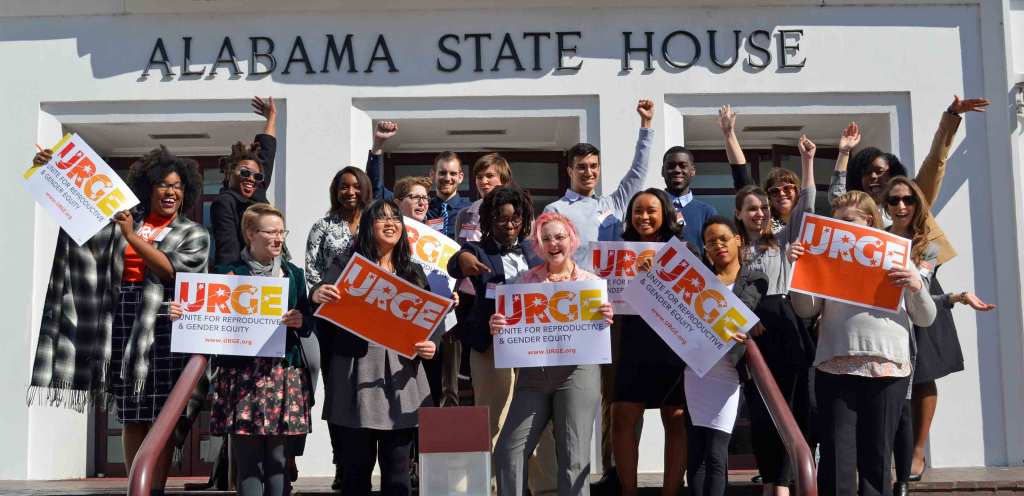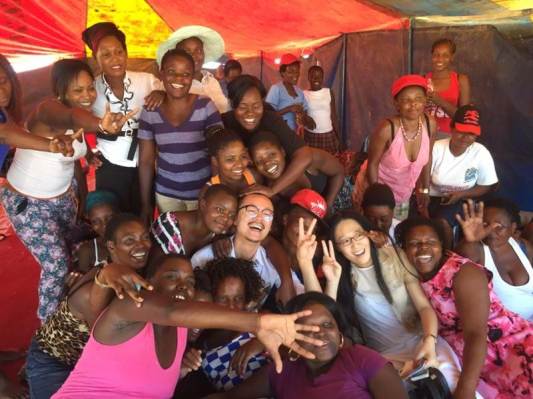
Kierra Johnson is executive director of URGE (Unite for Reproductive & Gender Equality), an organization working on the frontlines of gender equity and reproductive justice. For the youth-driven URGE, this means a broad, inclusive approach that takes into account the myriad ways that gender, reproductive rights, and sexual health issues impact a person’s life. URGE is among the sponsors of this weekend’s Women’s March on Washington, which will bring hundreds of thousands of people to the US capital to lift their voices in support of rights and dignity for women—and for all people—and to raise awareness and spur action on a constellation of interconnected issues.
A few days before the march, we talked to Johnson about why her organization is involved in this high-profile effort, and what’s ahead for the issues at the center of its mission.
URGE is one of the organizations that’s really leading the way in taking an intersectional approach to gender, sexuality, and reproductive justice. How would you explain what that means to someone who might not have a deep understanding of these issues?
Intersectionality (or even reproductive justice) can remain very philosophical if we don’t unpack and model those ideas. So here’s an example:
The night before the Women’s March, URGE is hosting an event in partnership with United We Dream and the NAACP’s Youth and College Division. It’s very intentional: What our organizations have in common is that we work with a diversity of young people across the country. A lot of the other organizations that are coming together and doing events around the Women’s March this weekend are doing so based on one issue. There’s a reception tomorrow night being put together by economic justice organizations, and another event on Sunday that was put together mostly in concert with reproductive health and justice organizations.
With us it wasn’t about being issue specific; it was about being responsive to our constituency: young people. While our everyday issue work may be distinct (civil rights, reproductive justice, immigration reform), our three organizations are united in our understanding that progressive change is our collective foundation—and justice is our collective vision. These times require a bigger vision, a broader frame, and taking action in solidarity. We believe that young people want to work that way, and we aim to operate that way because it’s a winning strategy.
In this election cycle, we saw people of color, women, and immigrants scapegoated for a failing economy, increased violence and terrorism, and America’s decline as a superpower. This narrative of blame was rooted in sexism, racism, and xenophobia, and it tapped into people’s fears. If that’s not intersectionality, I don’t know what is. So if we keep talking about race without gender, or if we’re only talking about gender and don’t know how to frame it in terms of economic justice, we’re going to lose the policy battle and the hearts-and-minds battle—because people live all of those things at the same time.
Why did URGE get involved in the Women’s March? Why is participating important to your work?
The swell of people who were so hungry to get here and show their support for gender equity shows unequivocally: Yes, there is a movement; yes, women are important—and the grassroots cares. We’re going to be behind anything that’s about women and young people and people of color coming together to demand their human and civil rights, to demand to be seen with dignity, to demand that their communities and their families are seen, valued, and cared for. That’s what this march signified for us from the beginning.
This is an opportunity for us to meet, potentially, thousands of people who care about these issues but don’t necessarily have a group or a community to do social justice work with. We want to introduce ourselves to this group of young people, and provide them with a place to feel valued and taken care of this weekend. We want to give them an opportunity to take action with us when they’re here, and also tee them up to be active after they finish this march. There’s so much more work to do.
You’ve been active in the movement for gender equity and reproductive justice for almost 20 years. What have you learned from that experience that informs your approach to what’s unfolding today?
One of the most important things I’ve learned is that we are only as effective as we are in touch with the grassroots. We have to listen and be responsive to everyday people, and how they are thinking about and living these issues. We’ve got to take our cues from the people we do this work with and for. If we don’t have the people behind us, any wins will be short-term wins.
I’ve also learned that while we think of ourselves as leading, organizations are often steps behind our constituents. Our constituents are much more willing to be bold and edgy and unapologetic and push the line. People want to see action and they want to see change; they want to be a part of that. So the more unapologetic and bold we are, the more people are interested in doing work with us.
Where do you see opportunities for progress right now? What gives you hope?
Gender equity is undeniably the catalyzing force behind the march. But racial justice and economic security quickly joined it, and became inseparable. I think it is precisely because these three areas have taken center stage that the march is going to be so big.
This show of power—the fact that the march is being organized by women, that gender was the calling card for all the other things to come together—is an illustration of what can happen when we center women and gender equity in all our work, whether that’s reproductive rights or immigrant rights, economic security or environmental justice. So there’s a great opportunity for organizers, activists, leaders of organizations, and representatives of movements to start thinking about gender as a central pillar of their work. But we need to be thinking broadly about what gender equity means, and how our understanding of it evolves and fortifies our social justice work moving forward.
Overall, to have the hope and vision of these young people surrounding us, keeping us accountable, is a beautiful, powerful thing. I wouldn’t want to be anyplace else.

